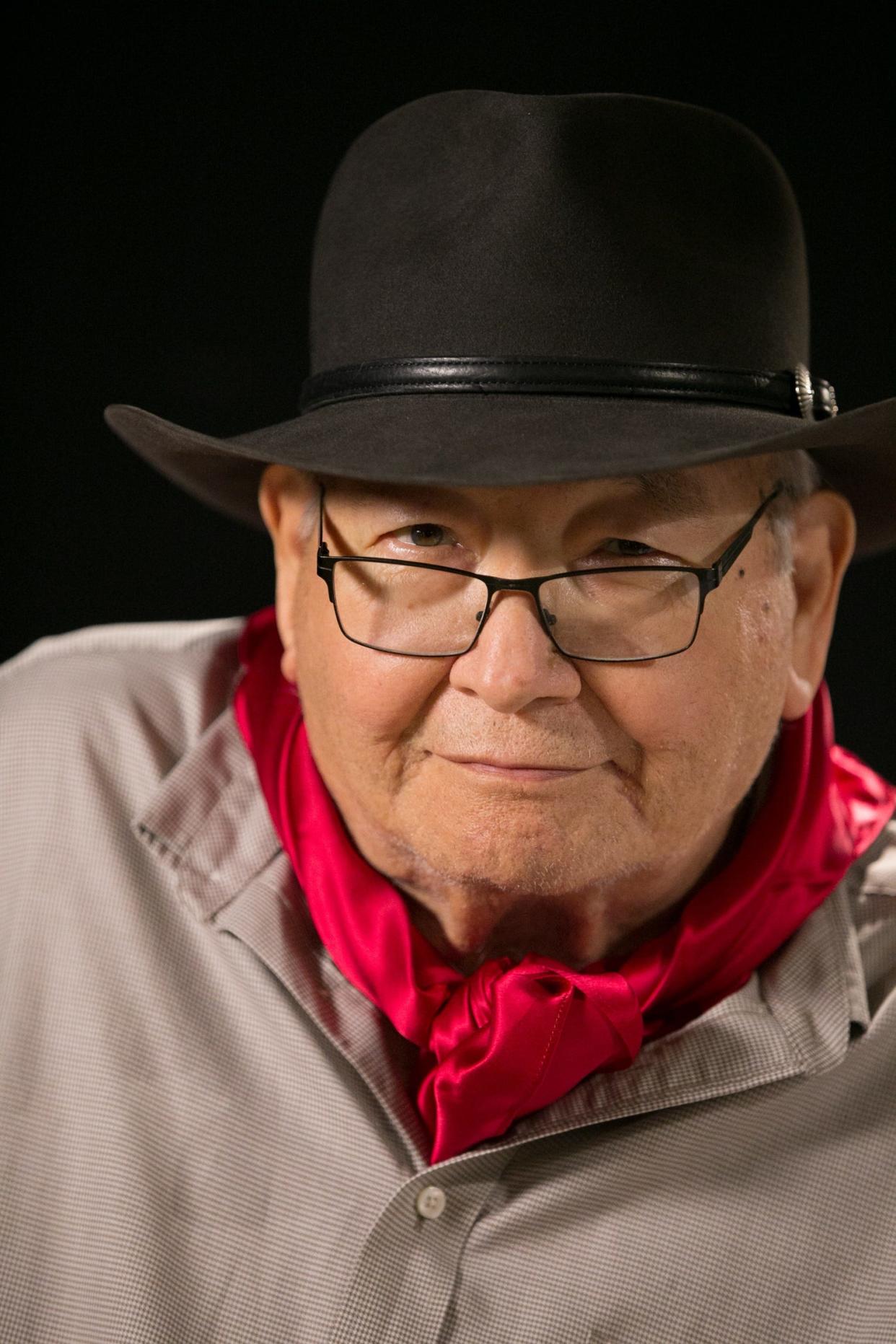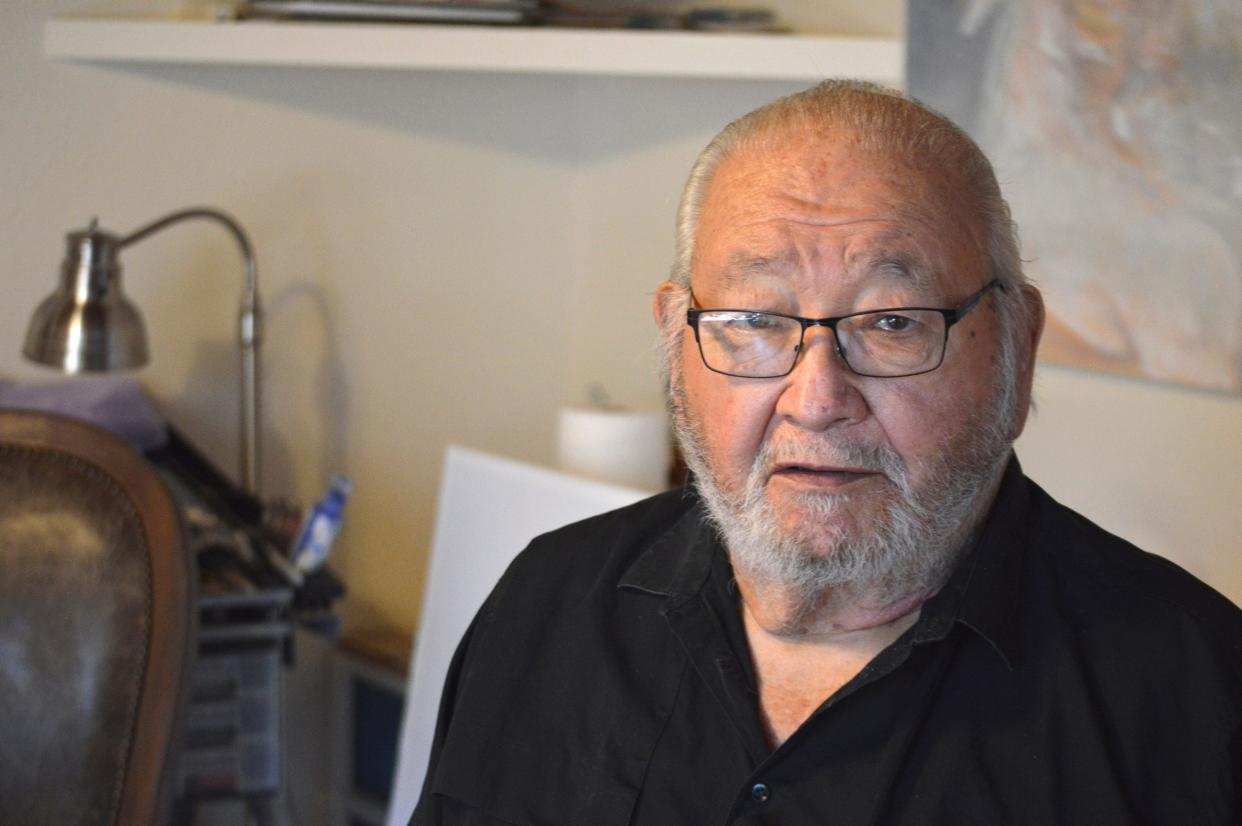N. Scott Momaday remembered for inspiring Native Americans to 'write our own stories'
Literary giant and Oklahoma native N. Scott Momaday died Wednesday, Jan. 24 at his home in Santa Fe, New Mexico, publisher HarperCollins announced.
He was 89.
A member of the Kiowa Tribe of Oklahoma, Momaday was the first Native American writer to win the Pulitzer Prize for Fiction. He earned the prestigious prize in 1969 with his novel “House Made of Dawn,” regarded as a breakthrough work in contemporary Native American literature.
“Throughout his life, N. Scott Momaday stayed closely connected to his Kiowa ancestry and sought to bring a sense of connection and understanding between that world and the world of his white brethren,” said Oklahoma Historical Society Executive Director Trait Thompson in an email to The Oklahoman.
“Using his amazing gift of storytelling, he brought to life the struggles of Native people across the country, made all the more real by his experiences growing up on reservations in New Mexico and Arizona.”
Momaday had been in failing health for some time and in June missed a ceremony at the Oklahoma History Center in his honor, with one of his daughters, Jill Momaday, attending in his stead.
Groundbreaking Kiowa author was born in Lawton
Navarre Scott Momaday was born Feb. 27, 1934, at the Kiowa Indian Hospital in Lawton, Oklahoma, to Alfred Momaday, a Kiowa painter, and Natachee Scott, a part-Cherokee writer. A year later, his parents — who went on to become educators as well as artists, a path their son later followed — moved the family to a reservation in Arizona.
In 1946, the family relocated again to Jemez Pueblo, New Mexico, about 45 miles north of Albuquerque.
Upon graduating from Augustus Military Academy in Fort Defiance, Virginia, Momaday attended the University of New Mexico from 1952 to 1956. After receiving his bachelor's degree in political science there, he submitted some of his poetry to a creative writing contest sponsored by Stanford University.
Yvor Winters, a longtime Stanford professor and renowned poet, secured a scholarship there for Momaday, who earned his master's and doctorate degrees in English and honed his skills as a fiction writer, poet and storyteller.
In 1967, Momaday published the first book that he wrote, “The Journey of Tai-me,” a collection of Kiowa stories, history and folklore, in a limited edition. It became the basis of his more expansive, personal and popular 1969 book, “The Way to Rainy Mountain,” which chronicled his pilgrimage to the grave of his Kiowa grandmother.
Lawrence SpottedBird, the chairman of the Kiowa Tribe based in Carnegie, said Momaday’s writing and life work has inspired other Kiowa citizens to “write our own stories.”
“He had inspired me, and not only a lot of Kiowa tribal citizens, but Native citizens all over the country,” SpottedBird said.
Momaday’s writing also made a tremendous impact in the broader understanding about Kiowa people, culture and history, SpottedBird said.

Joy Harjo calls Momaday ‘a father of contemporary Native literature’
In 1968, Momaday published his first novel, “House Made of Dawn,” a seminal work that again drew on his Native heritage and personal experiences. The novel centers on a Native American veteran named Abel who returns to his rural New Mexico home after fighting in World War II and finds himself caught between two worlds: the homeland and traditions of his people and the allure of industrialized America.
“I learned about him and his writing when I was an undergrad student at the University of New Mexico, and I had just started writing poetry. It was the very beginning (for me). All of us in Indian Country … we really looked up to him, because he crossed a lot of barriers for Natives, period, and especially in Native literature,” Tulsa-based former U.S. Poet Laureate Joy Harjo told The Oklahoman.
“His work was very groundbreaking. … He often addressed in his prose and in his poetry the power of language, how potent and powerful language is to shape our lives.”
The Muscogee musician, performer and writer, who served three terms as the first Native American U.S. poet laureate, called Momaday “a father of contemporary Native literature.”
“The place of trailblazers is to open the door so others can step through … and be inspired to hone and share their gifts with the community,” she said.
“Momaday was the first Native writer that I saw — and I was in college by then. … To win a Pulitzer Prize says, ‘Well, this is world-class literature.’ And it was written by a Native.”
Pulitzer Prize winner also wrote poetry and narrated documentaries
After winning the Pulitzer Prize, Momaday published several other works, including poetry collections, children’s books and plays, continuing to draw on his life experience and Native heritage in his writings.
“I want the Indian to remain an Indian and appreciate what that means. We are living in a time when identity is critical. We talk about an identity crisis — and everybody seems to have it — but the Indian in a special way has had an identity crisis from the time of contact,” Momaday told The Oklahoman in a 2012 interview.
“That's really the problem. ‘How do I enter the modern world but remain my Indian self?’ … One does that by identifying himself, by defining himself and not allowing himself to be defined.”
In 1976, Momaday released his memoir “The Names,” which chronicles his childhood in Oklahoma and the Southwest, followed in 1989 by his second novel, “The Ancient Child,” which draws from an ancient Kiowa myth of a boy who turned into a bear.
Along with writing, Momaday taught at Stanford University, the University of Arizona, the University of California-Berkeley and the University of California-Santa Barbara. He was a visiting professor at Columbia and Princeton and became the first professor to teach American literature in Moscow at Moscow State University in Russia.
He also was a commentator on National Public Radio, the voice of the National Museum of the American Indian of the Smithsonian Institution and the narrator of the PBS documentaries “Remembered Earth” and “Last Stand at Little Bighorn.” He most recently appeared on Ken Burns’ 2023 documentary series “The American Buffalo.”

Kiowa writer returned to his home state and served as Oklahoma’s Centennial Poet Laureate
The Kiowa author was awarded the National Medal of Arts in 2007 by President George W. Bush. Around that time, Momaday returned to live in Oklahoma for the first time since childhood, and Gov. Brad Henry appointed him as Oklahoma’s Centennial Poet Laureate.
Throughout his literary career, Momaday received numerous honors, including the Guggenheim Fellowship (1966), Geographic Society of Chicago Publication Award (1973) and the Zimmerman Award (1975).
He was inducted into the Oklahoma Hall of Fame in 1987, named an Oklahoma Cultural Treasure in 1999 and ushered into the National Native American Hall of Fame in 2018.
More: N. Scott Momaday, Pulitzer Prize winner and giant of Native American literature, dead at 89
“Dr. Momaday was immensely proud of his Native heritage and possessed a deep connection to our state. At his induction in 1987, it was both humbling and inspiring to be in his presence. His voice was mesmerizing. While the world will remember him as a Pulitzer Prize author, we will always remember Dr. Momaday as an Oklahoma treasure,” said Oklahoma Hall of Fame President and CEO Shannon Rich in an email.
Marking the 50th anniversary of his Pulitzer Prize, Momaday received in 2019 the Ken Burns American Heritage Prize and the Ambassador Richard C. Holbrooke Distinguished Achievement Award.
He also was the subject of the acclaimed 2019 documentary “Words from a Bear,” which premiered at the prestigious Sundance Film Festival, played at Oklahoma City’s deadCenter Film Festival and aired on PBS’ “American Masters.”
Directed by fellow Oklahoman and Kiowa tribal member Jeffrey Palmer, “Words from a Bear” features a starry roster of interviewees, including Harjo, Beau and Jeff Bridges, James Earl Jones and Robert Redford.
“All of them said yes. They loved Scott so much they wanted nothing more than to be in the film. And there could have been more,” Palmer told The Oklahoman in a 2019 interview.
"It just was perfect timing that all of these things came together, and we could celebrate not only N. Scott Momaday but also the fact that this novel really changed American literature."
According to The Associated Press, Momaday was married three times, most recently to Barbara Glenn, who died in 2008. He had four daughters, one of whom, Cael, died in 2017.
"Dr. Momaday’s work reminds us of the powerful ability of the arts, through poetry and words, to move us and live on in new and significant ways," said Oklahoma Arts Council Executive Director Amber Sharples in an email.
Contributing: The Oklahoman’s Molly Young and The Associated Press.
This article originally appeared on Oklahoman: Oklahoma native and Pulitzer Prize winner N. Scott Momaday dies at 89
